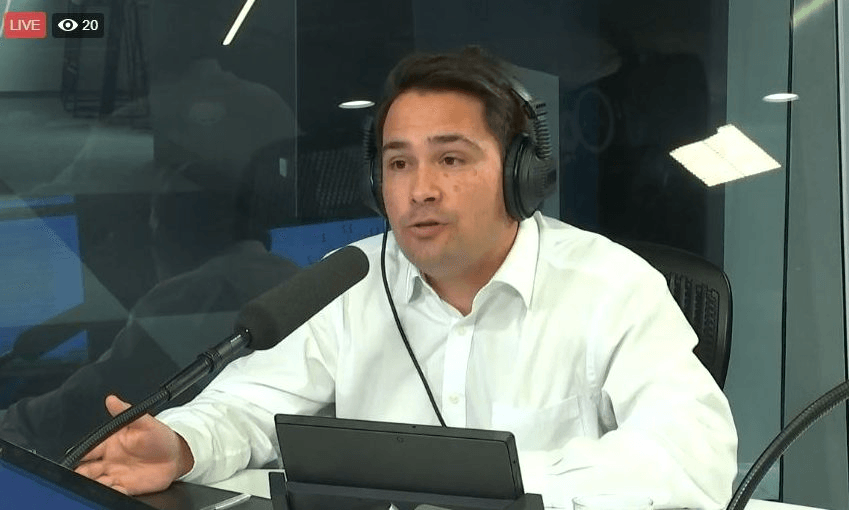National leader Simon Bridges went on Radio Live this afternoon and came out in favour of the two big NZ media print companies’ bid to merge. Does that mean it will become a partisan issue?
Doing a long radio spot as a politician is difficult. An issue can come up basically out of nowhere, the conversation can pivot, and suddenly you’re on the spot. It turns out Simon Bridges is actually pretty good at it. On with Ryan Bridge on Radio Live this afternooon, he may not have had the interviewing chops of regular host Lisa Owen, whom he was nominally filling in for. But he rolled with the punches, once for example being asked if he’d ever been in a fight, off the back of a boxing story. “Oh, everyone’s been in a fight,” he tossed out casually, before narrowing it down to around 1994.
For media organisations, the crucial segment came towards the end of the first hour. The merger between Australian TV heavyweight Nine and print giant Fairfax (owners of New Zealand’s Stuff) came up, and Bridges basically argued it was a necessary evil for the industry. And he said the same issues faced in Australia around declining revenue were also being faced here by Stuff and NZME.
“They’ve got to do what they’ve got to do,” said Bridges.
“What we’re seeing at the moment is a model that’s broken … the economics don’t work,” he said. “So if this is what media outfits have to do to stay strong, and to keep us providing content that’s relevant to us, then yeah I see that.”
He added: “From a New Zealand context I understand the jobs point, we shouldn’t take that lightly, but as long as you’ve got other voices – whether it’s bloggers, homegrown things coming up that are talking and doing things – I’m personally reasonably relaxed about this sort of stuff.”
And what of the Commerce Commission’s refusal to greenlight the merger bid? “I just wonder if they’re taking a bit of an outdated view of these things, they’re taking a 19th century view to what is a 2018 problem,” he said.
Currently the merger remains in the courts, after yet another appeal.
The comments were interesting in part because they were made on a Mediaworks station – itself a potential suitor for a merger somewhere down the track. Simon Bridges also offered them a sop later in the segment, saying it was fair enough for privately media organisations to feel aggrieved about not getting more NZ on Air funding.
“Look at you at Mediaworks, you’re out there in the big bad commercial world. You’ve got to pay your own way in life,” he noted, though made no mention the loan Mediaworks got in 2011.
On the merger question, Bridges said that as long as there remained competition and “a plurality of voices” including “ethnic media”, then “what’s the problem?”
And fair play to him: when I interviewed him months ago he said that he liked the diversity of voices on The Spinoff. And as NZME managing editor Shayne Currie tweeted, there were a lot of microphones at the Commerce Commission’s decision announcement.
ComCom fears loss of competition. How many microphones are there at this press conference? pic.twitter.com/WoMukZHj3z
— Shayne Currie (@ShayneCurrieNZH) May 2, 2017
Broadcasting minister Clare Curran was certainly concerned about loss of diversity in 2016, when she spoke out against it in the ODT as an opposition spokesperson. She hasn’t spoken about it all that much since, which is probably wise, though the focus of her portfolio is clearly on public media. It sets up a clear division in priorities. While Simon Bridges said there would always be a place for public media, he wasn’t exactly a champion of it, and the model he was arguing for offered a lot more leeway for privately owned companies to act in their commercial interests.
That could be read a few different ways. It could be seen as a signal to media companies that a different government would create policy more in their favour – which in commercial terms a merger, and greater access to NZ on Air money most certainly would. Both the major commercial radio companies would love the opportunity to gain market share back off Radio NZ, and Mediaworks TV division would feel the same about TVNZ.
So does that incentivise those companies to give the National Party better coverage? On balance, no. The journalists would be seriously unlikely to go along with it – that’s simply not in their nature. And obviously slanted coverage would be picked up by audiences and assessed as such, and audience share could suffer as a result because of that.
However it does signal broadcasting issues could be politically contentious going forward. If the merger is rejected again, one of the grounds is almost certain to be media plurality. And it will be by far the last time battles between private and public organisations come out in broadcasting between now and the election. And it is pretty clear that if the Treasury benches change, so will the priorities.
The Bulletin is The Spinoff’s acclaimed, free daily curated digest of all the most important stories from around New Zealand delivered directly to your inbox each morning.

